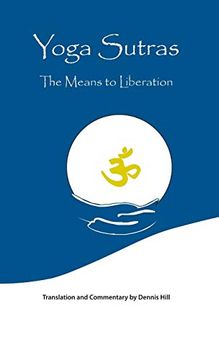Compartir
Yoga Sutras: The Means to Liberation (en Inglés)
Dennis Hill
(Autor)
·
Trafford Publishing
· Tapa Dura
Yoga Sutras: The Means to Liberation (en Inglés) - Hill, Dennis
26,92 €
28,34 €
Ahorras: 1,42 €
Elige la lista en la que quieres agregar tu producto o crea una nueva lista
✓ Producto agregado correctamente a la lista de deseos.
Ir a Mis ListasSe enviará desde nuestra bodega entre el
Martes 18 de Junio y el
Jueves 20 de Junio.
Lo recibirás en cualquier lugar de España entre 1 y 5 días hábiles luego del envío.
Reseña del libro "Yoga Sutras: The Means to Liberation (en Inglés)"
The Yoga Sutras were compiled about 2,000 years ago by the sage Patanjali from an oral tradition reaching back into unknowable antiquity. He gives us the essential wisdom for the practice of yoga and meditation to know, first hand, the essence of our true Self-the conscious indweller that enlivens this body. Experiencing the fully conscious state shows us the essential transcendent nature of the universe to bring us a state of undisturbed joyous tranquillity. Traditionally, this wisdom has been handed down from master to student as a transmission of the means to liberation. Patanjali tells us that the pure blissful inner Self is already attained and all that is required is to lose interest in that which is not the Self. This is pretty straight forward, and we learn all we need to know in the first three sutras. Presuming we will not get it the first time, he goes on to detail the nature of the Self, the practices that will awaken us, the attainments that arise from the practices and then explains about the state of final liberation. Throughout the book we are reminded of two fundamental practices that lead to the final state, kaivalya. One practice is vairagya (dispassion, non-attachment) and the other is viveka (discrimination). In the practice of viveka, we learn to discriminate between the mind and the watcher of the mind (consciousness itself). When we can rest in the state of consciousness knowing itself; we answer the question, "Who am I?" Also available from this author: The Inner Yoga of Happiness
- 0% (0)
- 0% (0)
- 0% (0)
- 0% (0)
- 0% (0)
Todos los libros de nuestro catálogo son Originales.
El libro está escrito en Inglés.
La encuadernación de esta edición es Tapa Dura.
✓ Producto agregado correctamente al carro, Ir a Pagar.

